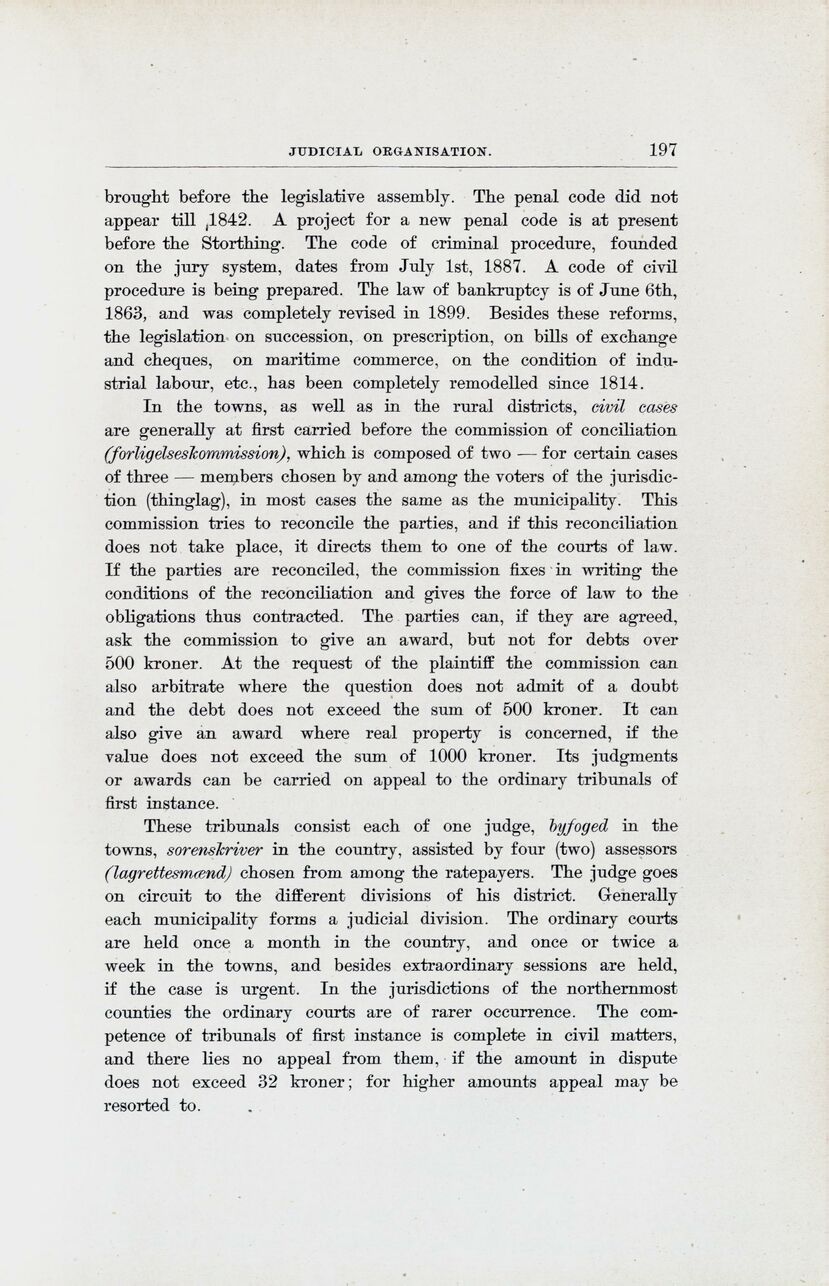
Full resolution (JPEG) - On this page / på denna sida - Judicial Organisation, by A. Færden

<< prev. page << föreg. sida << >> nästa sida >> next page >>
Below is the raw OCR text
from the above scanned image.
Do you see an error? Proofread the page now!
Här nedan syns maskintolkade texten från faksimilbilden ovan.
Ser du något fel? Korrekturläs sidan nu!
This page has been proofread at least once.
(diff)
(history)
Denna sida har korrekturlästs minst en gång.
(skillnad)
(historik)
brought before the legislative assembly. The penal code did not
appear till 1842. A project for a new penal code is at present
before the Storthing. The code of criminal procedure, founded
on the jury system, dates from July 1st, 1887. A code of civil
procedure is being prepared. The law of bankruptcy is of June 6th,
1863, and was completely revised in 1899. Besides these reforms,
the legislation on succession, on prescription, on bills of exchange
and cheques, on maritime commerce, on the condition of
industrial labour, etc., has been completely remodelled since 1814.
In the towns, as well as in the rural districts, civil cases
are generally at first carried before the commission of conciliation
(forligelseskommission), which is composed of two — for certain cases
of three — members chosen by and among the voters of the
jurisdiction (thinglag), in most cases the same as the municipality. This
commission tries to reconcile the parties, and if this reconciliation
does not take place, it directs them to one of the courts of law.
If the parties are reconciled, the commission fixes in writing the
conditions of the reconciliation and gives the force of law to the
obligations thus contracted. The parties can, if they are agreed,
ask the commission to give an award, but not for debts over
500 kroner. At the request of the plaintiff the commission can
also arbitrate where the question does not admit of a doubt
and the debt does not exceed the sum of 500 kroner. It can
also give an award where real property is concerned, if the
value does not exceed the sum of 1000 kroner. Its judgments
or awards can be carried on appeal to the ordinary tribunals of
first instance.
These tribunals consist each of one judge, byfoged in the
towns, sorenskriver in the country, assisted by four (two) assessors
(lagrettesmænd) chosen from among the ratepayers. The judge goes
on circuit to the different divisions of his district. Generally
each municipality forms a judicial division. The ordinary courts
are held once a month in the country, and once or twice a
week in the towns, and besides extraordinary sessions are held,
if the case is urgent. In the jurisdictions of the northernmost
counties the ordinary courts are of rarer occurrence. The
competence of tribunals of first instance is complete in civil matters,
and there lies no appeal from them, if the amount in dispute
does not exceed 32 kroner; for higher amounts appeal may be
resorted to.
<< prev. page << föreg. sida << >> nästa sida >> next page >>